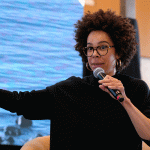
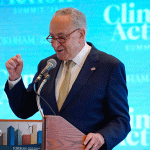
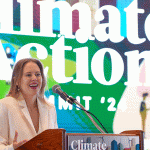

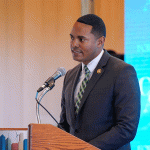

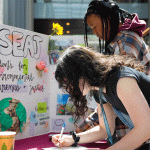
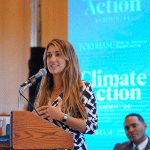


Daylong Event Calls for Grassroots Action and Celebrates Fordham’s Role as EPA Grantmaker
We don’t all have to be scientists to fight climate change, a prominent marine biologist and activist told Fordham students, activists, and members of the Bronx community at Fordham’s Rose Hill campus on April 8.
“I think what the world needs, right now more than ever, are people who can move between different disciplines,” said Ayana Elizabeth Johnson, Ph.D.
“We need people to solve climate problems in business, in engineering, in law, in medicine … all of these things relate to the world and how it’s changing. Everyone needs to know at some fundamental level what’s happening.”
Johnson, a marine biologist and co-founder of the group Urban Ocean Lab, was the keynote speaker of Fordham’s second annual Climate Action Summit. Her speech, on a day when millions of Americans paused to take in a rare solar eclipse, was a reflection of her personal journey and activism taken from her forthcoming book, What If We Get It Right? (Penguin Random House). She also sat for a Q&A session with H. Shellae Versey, Ph.D., an associate professor of psychology at Fordham.
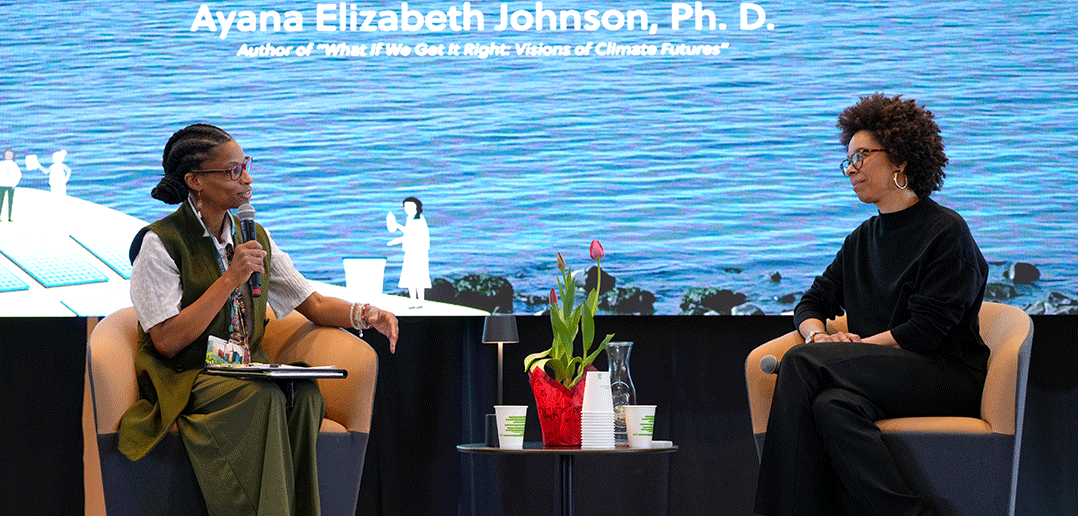
The work she’s done on behalf of communities from New York City to the Caribbean, she said, was always bolstered by a belief that anyone can be a part of the fight–including those who, like her father, were held back by racism, or those like her, “brimming with juxtapositions.”
“I’m a scientist who always intended to have a career in policy. I’m the daughter of a practical school teacher and a wistful artist. I’m cold New York winters and Caribbean heat,” she said.
“I’m working class and Harvard. I’m Black and white. I’m urban and smitten with the wilderness. I’m proof of the American dream—and proof that it is all too rare.”
The notion of taking a leadership role in fighting climate change was also the focus of other activities during the summit, which was organized by Fordham’s Center for Community Engaged Learning. An expo featured community groups, fireside chats, and panel discussions that examined federal funding for community-led solutions, as well as the future of environmental justice in higher education.
Elected Officials Celebrate Fordham’s Role as EPA Grantmaker
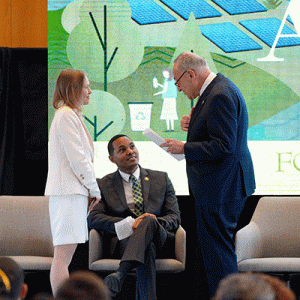
A morning press conference featured Senate Majority Leader Chuck Schumer and Congressman Ritchie Torres, who praised Fordham for taking on the responsibility of distributing $40 million EPA funds through a grant it was awarded in December. The grant, which will be administered by the Center for Community Engaged Learning, was the direct result of the Inflation Reduction Act (IRA), which was passed in 2022.
No Better Place
“We couldn’t have thought of a better place than Fordham to dispense this [funding]to go to grassroots groups,” said Schumer, who was instrumental in passing the IRA.
Torres added the program is benefiting the Bronx not by accident, but by design. “We designed the Inflation Reduction Act to lift up the lowest-income communities of color, especially the Bronx, which has been Ground Zero for environmental injustice,” he said.
The Bronx Is Not Burning; the Bronx Is Greening
“For a Bronx-based institution to receive $50 million in federal funding to distribute throughout the region is nothing short of staggering and unprecedented. And so, with the partnership of Fordham University, we are writing a new chapter in the story of the Bronx. The Bronx is not burning; the Bronx is greening.”

Also attending the celebration was U.S. Rep. Adriano Espaillat. Others who could not attend sent staff members, including Gov. Kathy Hochul, Sen. Kirsten Gillibrand, U.S. Rep. Paul Tonko, Bronx Borough President Vanessa Gibson, City Council Member Oswald Feliz, Westchester County Executive George Latimer, and Ulster County Executive Jen Metzger. See more elected official comments here.
Tania Tetlow, president of Fordham, said the grant, which will see the Center for Community Engaged Learning working with partner organizations from New York to Puerto Rico, epitomizes the mission of Fordham.
“This is so very us, this idea of connecting science with justice, of thinking about how we wake people up to the dangers ahead, and the chances to work together and inspire action and bring hope to an issue that can make us all despair and want to look away,” she said.
Julie Gafney, Ph.D., assistant vice president for strategic mission and executive director of the Center for Community Engaged Learning, thanked those responsible for the funding, community partners, and all those that will be involved in the project.
“Many of you are going to be partners in this work as we move ahead and really reorient Fordham around an initiative of public impact and social responsibility and see how traditional teaching, learning, and research can be leveraged in real-time toward community solutions.”
]]>Below are sentiments they have shared as Fordham begins this critical and historic work.
“This first-of-its-kind effort, that I made sure we amply funded in the historic Inflation Reduction Act, to directly invest in grassroots environmental justice groups is critical to fighting the carbon pollution worsening asthma, driving climate change and increasing the likelihood and severity of devastating extreme weather events,” said U.S. Senate Majority Leader Charles Schumer. “This $50 million for Fordham University to fund environmental justice projects is the kind of program that can help our disadvantaged communities effectively fight the pollution that harms them. I am proud of Fordham University and I’m so excited to see how the vibrant network of New York and Puerto Rican grassroots environmental justice organizations access and activate this federal funding. I remain laser-focused on implementing the IRA so that we can ensure it lives up to its transformative potential to clean our air and combat climate change.”
“EPA’s Environmental Justice Thriving Communities Grantmaking program is a vital new program that will advance environmental justice and help communities disproportionately impacted by climate change, pollution, and other environmental stressors,” said U.S. Senator Kirsten Gillibrand. “I am thrilled to see that Fordham University has been selected as the Grantmaker for EPA Region 2, which will allow organizations in New York, other communities within the Region, and Puerto Rico to apply for funds to support a range of different environmental project activities that will help the communities most in need. I am proud to have worked with and supported Fordham University to help secure its selection as a grantmaker and look forward to seeing communities that have long faced underinvestment gain access to federal environmental justice funding.”
“Fordham University’s commitment to environmental justice through its Flourishing in Community program and Climate Action Summit 2024 has been exemplary,” said U.S. Representative Ritchie Torres (NY-15). “By investing $40 million in grants to community-based organizations with a prioritization on marginalized communities, Fordham is not just talking about change — they’re actively implementing it. Initiatives like these, focusing on participatory governance and community-led solutions, are crucial for a sustainable future for the Bronx and the nation. I commend Fordham for their leadership and hope more institutions follow their example.”
“Fordham University’s resounding call to action comes in the form of their EPA Grant, which will facilitate climate justice initiatives for environmentally disadvantaged communities in the Bronx,” said City Council Member Oswald Feliz. We are constantly working to provide accessibility to communities disproportionately affected by pollution and climate change. With Fordham’s Climate Action Summit, we will witness new insights on sustainability and environmental justice for our Bronx community.”
]]>Fordham will receive the funds over three years, working with partner organizations to help uplift disadvantaged and hard-to-reach communities as well as those disproportionately affected by climate change, pollution, and other environmental stressors. Fordham is one of just 11 institutions nationwide selected to manage $550 million in federal funds earmarked for the program.
“Fordham University stands for impact on the world and finding solutions to the most urgent problems,” said President Tania Tetlow. “Fordham combines cutting-edge research with a deep connection to community, building on 182 years of engagement with the Bronx and expanding outward across the globe. This project embodies Fordham’s mission. We believe in the power of community-driven solutions to climate change to capture the insights and ingenuity of the people on the front lines of global warming.”
Approximately $10 million of the award will be designated for the grantmaking operation and related programming, as well as for Fordham’s own research. Serving as the EPA Region 2 grantmaker for the project, called the 2023 Environmental Justice Thriving Communities Grantmaking Program, Fordham will allocate the remaining $40 million in subgrants ranging from $75,000 to $350,000 to foster various environmental justice initiatives. Fordham’s Center for Community Engaged Learning is leading the initiative, which will be directed by Julie Gafney, Ph.D., assistant vice president for strategic mission initiatives, and Surey Miranda, director of campus and community engagement.
Community and Academic Partners
The University is collaborating with key community and academic partners, including the New York Immigration Coalition, New Jersey Alliance for Immigrant Justice, ConPRmetidos in Puerto Rico, Community Foundation of the Virgin Islands, Business Initiative Corporation of New York, and several universities across the target regions. This collaborative approach will ensure a broader impact and integrate the University’s research and teaching with real-world environmental justice efforts.
Communities will be able to apply to Fordham for a subgrant to fund a range of different environmental project activities, including small local clean-ups, local emergency preparedness and disaster resiliency programs, environmental workforce development programs, air quality and asthma-related projects, healthy homes programs, and projects addressing illegal dumping.
The Fordham grantmaking initiative—called Flourishing in Community—will support each subgrant with a Community of Practice group that includes faculty, community leaders, and graduate assistants, ensuring comprehensive support and maximizing effectiveness.
“This grant is the direct product of Fordham’s commitment to center environmental justice and sustainability in our public impact teaching, learning, and research. In Fordham’s Flourishing in Community Grantmaker Initiative, we created a transformative approach that offers a new vision of higher education: one that values community impact alongside cutting-edge research,” said Gafney. “Our initiative not only provides grants to disadvantaged and disproportionately impacted communities but also extends to comprehensive wraparound support, ensuring the sustainability and impact of these crucial community-led projects.”
The grant also underlines Fordham’s commitment to STEM curricular development, as well as the University’s engagement with communities as they respond to the most pressing issues facing our city and our nation.
“We are grateful to have worked alongside our partners across EPA Region 2 to ensure accessibility to this much-needed funding for all,” said Miranda. “We aim to ensure that the most impacted communities can leverage the funding and technical assistance available through the program. This will help build their capacity and strengthen the work already taking place in New York, New Jersey, Puerto Rico, and the U.S. Virgin Islands.”
Lisa F. Garcia, EPA Region 2 administrator, said Fordham’s work with the agency “will be the start of a fruitful relationship that will build upon both EPA’s commitment to addressing climate injustice and Fordham’s promise of environmental stewardship.”
“As a grantmaker, Fordham University will help the EPA advance environmental justice in a direct way that will help to undo the past harms of environmental injustice,” Garcia said.
A ‘Transformative Opportunity’
Rafael Roger, president of Business Initiative Corporation of New York, one of Fordham’s partners, said the Flourishing in Community initiative is a chance to “begin addressing environmental issues that will improve the lives of millions of people.”
“This opportunity is transformative for our region and will bring justice to communities that have been marginalized,” he said. “While creating jobs and improving buildings is part of our mission, being able to add ‘improving the environment’ is a new benchmark.”
Amy Torres, executive director with the New Jersey Alliance for Immigrant Justice (NJAIJ), said that “too often, New Jersey is the punchline in jokes about pollution, contamination, or hazardous waste. But for New Jerseyans who bear the brunt of environmental racism or who have been displaced by climate crisis, it’s no laughing matter.”
“As the state’s largest immigration coalition, NJAIJ is proud to be a part of the collaborative effort under Flourishing in Community,” she said. “Together, we will uplift the voices of those most impacted in EPA Region 2—in particular climate refugees, agricultural workers, and people displaced or harmed by environmental racism.”
Dee Baecher-Brown, president of the Community Foundation of the Virgin Islands, said her organization is “honored” to be Fordham’s partner in this work.
“CFVI recognizes the significance and potential impact of this grant in advancing environmental justice and addressing the needs of overburdened communities, and is poised to employ our extensive experience and infrastructure to maximize the value of Flourishing in Community in the U.S. Virgin Islands,” Baecher-Brown said.
Also in the Caribbean, Isabel Rullán, co-founder and executive director of ConPRmetidos in Puerto Rico, said that she and her colleagues would bring their own grantmaking experience to bear and “prioritize supporting underrepresented groups focusing on eliminating barriers that limit organizational development.”
Murad Awawdeh, PCS ’19, executive director of the New York Immigration Coalition, said the organization is proud to partner with Fordham on its environmental justice efforts.
“This new funding from the EPA is an important first step in ensuring more community-based groups have the support they need to bring attention to and continue to alleviate the impacts of climate change, pollution, and other environmental stressors on immigrants, low-income communities, and people of color,” he said.
Those interested in learning more about the program—including how to apply for grants—can fill out this form.
For media inquiries, contact Jane Kidwell Martinez, Fordham’s director of media relations, at [email protected] or 347-992-1815.
]]>Speaking at “Moral Heat: Ethical Dimensions of Environmental Regulation and Economics in the 21st Century,” scholars, business leaders and federal regulators acknowledged the seriousness of climate change. They offered ethical solutions, key of which were regulatory increases by the federal Environmental Protection Agency (EPA).
 |
| John Caroselli and National Grid have partnered with consumers to reduce energy consumption. Photo by Chris Taggart |
“The EPA has a core mission of providing clean air, providing clean water and reducing waste,” said John Filippelli, the EPA’s chief of strategic planning and multimedia programs. “But every other partnering initiative will be affected by climate change.”
Since President Obama appointed Lisa Jackson as the EPA’s administrator, the agency has taken on a much more active role in helping to regulate the causes of climate change with a broader ethical concern, said Filippelli and a co-worker, Warren Lux, the EPA’s director in human research ethics.
In fact, the EPA recently enacted regulations requiring the monitoring and reporting of annual greenhouse gas (GHG) emissions from large GHG emitters, after determining that such emissions were endangering public health.
“One year later, the EPA has an expanded vision of its priorities,” Lux said. “There is a focus on compliance and oversight.”
Lux went on to outline two of the newest EPA initiatives that call for more environmental justice principles to be reflected in all of the EPA’s decisions, and for building partnerships to facilitate better enforcement and compliance at the grassroots level.
Pai-Yei Whung, chief scientist in the EPA’s Office of the Science Advisor, outlined how greenhouse gases caused by carbon dioxide and black carbon emissions affect the health of all living systems on Earth.
“We look at health and climate change impact from a more comprehensive ‘One Health’ perspective,” Whung said.
She outlined the connections between human health, agricultural and animal health, ecosystem health and the health of the world’s oceans.
“By capitalizing on the natural links between animal and human health, One Health seeks to improve the health of all species,” she said.
The ethical role of big business in tackling climate change can start through a successful campaign/partnership toward environmental sustainability, said John Caroselli, executive vice president of the international utility company National Grid.
“We have six million customers who are very sensitive to environmental concerns, but they are also concerned with price,” said Caroselli, whose company has made a commitment toward 80 percent carbon reduction by 2050.
To create affordable sustainability, National Grid has begun an ad campaign to encourage its customers toward a voluntary three percent reduction in energy use—saving customers’ money while saving energy.
“We’ve gotten a lot of comments about how this [campaign]flies in the face of making money,” Caroselli said, “but we want to be leaders in this [green]movement.”
The day’s participants acknowledged skepticism about climate change that permeated the political landscape.
“I encourage you in academic institutions to keep rational public debate alive,” Filippelli said. “One of the things hurting public debate is sound bytes.”
The conference was a joint effort by Fordham’s Center for Ethics Education, Schools of Business Administration, and the EPA, with support from National Grid. In welcoming conference attendees, Joseph M. McShane, S.J., president of Fordham, said that humans hold the Earth in stewardship.
“The world was created by a loving God to be held in trust while we are here for the generations to follow,” Father McShane said. “So there is a moral imperative involved in the pursuit of a more environmentally sane policy for us all.”
]]>